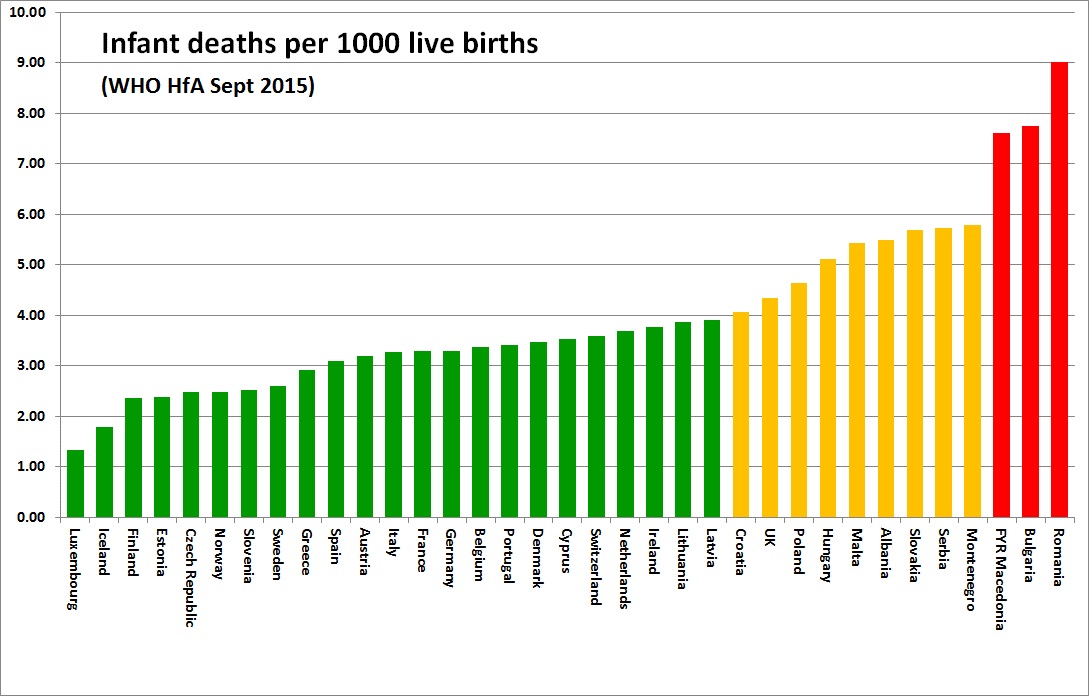Jan 28 2016
European healthcare is steadily improving, in spite of alarm bells about financial crisis austerity measures, aging population and migration turmoil. Survival rates of heart disease, stroke and cancer are all increasing. Infant mortality, perhaps the most descriptive single indicator, keeps going down. This is a main conclusion from the 2015 Euro Health Consumer Index (EHCI), published today by the Health Consumer Powerhouse (HCP) Ltd. The EHCI, started in 2005, is the leading comparison for assessing the performance of national healthcare systems in 35 countries.
The EHCI analyses national healthcare on 48 indicators, looking into areas such as Patient Rights and Information, Access to Care, Treatment Outcomes, Range and Reach of Services, Prevention and use of Pharmaceuticals. The new Index ranks the countries:

Eight countries, all Western European, are scoring above 800 points of the maximum 1000. These are followed at some little distance by four other affluent countries (Denmark, Sweden, France and Austria) “not quite making it” for different reasons. The first CEE country, the Czech Republic, is closing in, now only 14 points behind Austria. The Netherland stays the European Champion and the only country reaching above the 900 points level.
Closing equity gap?
The increasing equity gap between wealthy and less wealthy European countries, noted in the EHCI 2013 and 2014, shows signs of closing again in the 2015 edition, explains Professor Arne Bjornberg, head of HCP Index research. The eight least affluent countries gain on average 32 score points between 2014 and 2015. One explanation can be that most of the countries at the lower end of the rank have improved speed and accuracy of healthcare data reporting. A new trend? That remains to be seen.
Indicators such as Cancer Survival or Infant Mortality keep showing improvement over time. This is true also for countries such as the Baltic states, which have undergone a financial “steel bath”, in every way comparable with that hit southern Europe or Ireland. As an example, both Latvia and Lithuania have shown remarkable improvement in Infant Mortality right during the period of the worst austerity measures.

In 2006, only five countries scored green on Infant mortality compared to no less than 23 in 2015, with only three countries still scoring Red. The country average keeps dropping: from 4.49 in EHCI 2012, to 4.01 in 2015. A silent, lifesaving revolution!
These are the top country skills
Few countries show excellence in every part of healthcare. Below the "performance profile" of the top score national health systems:
| Top country/countries |
Sub-discipline |
Score |
Maximum score |
| Netherlands, Norway |
1. Patient rights and information |
146 |
150 |
| Belgium, Switzerland |
2. Accessibility |
225! |
225 |
| Iceland, Netherlands, Norway |
3. Outcomes |
240 |
250 |
| Finland, Netherlands, Sweden |
4. Range and reach of services |
144 |
150 |
| Norway |
5. Prevention |
113 |
125 |
| Finland, Germany, Ireland, Netherlands, UK |
6. Pharmaceuticals |
86 |
100 |
The indicators behind the sub-disciplines are listed in the full EHCI 2015 report (chapter 8.7 Indicator definitions and data sources for the EHCI 2015) as well as country-specific explanations and comments.
Some key comments on the 2015 EHCI
- The 2006 EHCI had France as the champion with 768 points out of 1000. In the 2015 EHCI, the same performance would give just the 13th position among 35 countries. Top performance ten years ago has today become European average!
- Health systems based on social insurance, with a multitude of insurance organisations, who are organisationally independent of healthcare providers, are called Bismarck systems. There are also systems where financing and provision are handled within one, integrated organisation (Beveridge systems). EHCI finds that generally Bismarck style countries, such as the Netherlands, Belgium, Germany and France, provide superior care.
- As said, in spite of financial stress, European healthcare keeps improving. An important explanation is that the cost of medicines have been reduced by changing from patented drugs to generic brands – without any negative effects identified by the EHCI.
- Learning from successful neighbours would be a good recipe. Finland can teach how to get rid of long waiting lists, FYROM on implementation of e-health services, the Baltic states how to keep improving under severe financial crisis and the Netherlands how to further develop an already highly user-friendly system. Also negative experience can be valuable: do not copy the Swedish waiting time paralysis, the Hungarian and Polish performance down-slide or the uncontrolled Italian "regionalisation". Finally, think about how come Greece claims to have cut the health budget with 28 percent – without any noticeable negative outcomes in the EHCI?
HCP leads the way
After ten years of HCP evaluation action, the European Commission now has announced a plan to start its own assessment of the cost efficiency of member state health systems. In what way and speed EU will deliver remains to be seen but the recognition is important: open benchmarks do drive healthcare development. HCP welcomes the EU engagement, says Johan Hjertqvist, HCP founder and president.